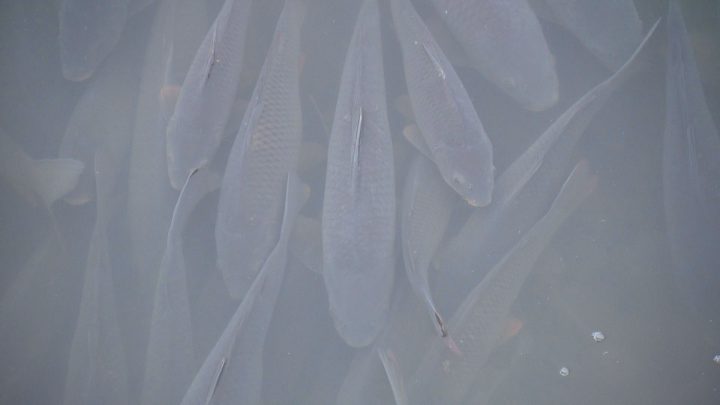Where thin ice and open water meet — so do hundreds of large carp.

A massive pileup of the fish has formed in Wascana Creek in Regina near a bridge running through A.E. Wilson Park. The scene is sparking curiosity among those who frequent the area.
“They’re just packed in there — and they’re going nowhere. It’s quite strange,” said Julie Miles, who walks through the park every day.

Miles said she first spotted the scaly congregation two days ago, adding the open water area was “absolutely packed” with carp.
But a biology professor at the University of Regina (U or R) said the fishy behaviour is not out of character, given the recent warmer conditions.
Peter Leavitt explained as water temperatures rise, oxygen levels drop. There’s also limited open water and ice coverage restricts the flow of oxygen into the creek.
“The fish are running out of oxygen and they’re coming up to the surface, any time they can get access to it, to get a drink of oxygen,” he said.

Get breaking National news
Leavitt said the situation will likely worsen for the carp when the air temperature cools and more ice covers the water.
“It’ll be tougher on the fish because there will be more oxygen, but there’s less space to get it. It’s a traffic jam,” he said.
“At the end of the day, losing the invasive carp is not a bad thing.”
There are instances when oxygen in ice-covered water runs out entirely, leading to a phenomenon known as “winter kill.”
Leavitt said this is what caused a large number of dead fish washing ashore in Wascana Lake last spring.
“All the fish suffocate. They can’t drink enough, they can’t gulp enough air,” he said, adding this particularly affects large fish and fish with high metabolism.
Nature giving invasive fish the boot
While a suffocating pile of fish sounds like a sad sight, Leavitt said it’s good for aquatic species native to the area.
“They’re pretty well adapted to low oxygen levels,” he said, adding minnows and other small fish survive well in winter.
“The walleye and jack — fish like that — tend to pick habitats where they’re not going to get stressed out. And so it’s the invasive species that tend to take it on the chin.”
Leavitt said the carp in Regina creeks appear to be the result of people flushing pet fish — presumed dead, but not — into the water system.
“At the end of the day, losing the invasive carp is not a bad thing,” he said, adding the bottom-feeders disturb the nutrient balance in creek and lake beds.
“That stirring up of the mud (at the bottom) releases nutrients into the water and that produces more algae — the green stuff — some of which is toxic.”
Global News reached out to the City of Regina for comment on how it’s handling the invasive species in the creek.
In an email, a city spokesperson said they will “monitor the situation and take action when required.” No further clarification was provided.


Comments
Want to discuss? Please read our Commenting Policy first.